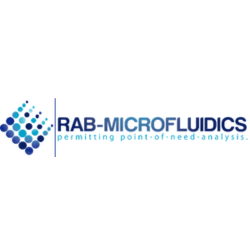In order to detect potential machine failure, oil samples are taken from heavy machinery such as compressors, gear boxes, generators or engines, then analysed by laboratories. By analysing oil samples, owners and operators can tell how well the machinery is performing and when the machinery will break down. Undetected and unsolved lubrication degradation and contamination can lead to early failure of key components, with significant cost implications.
There is a large financial expense associated with sampling, and a risk that the machinery could breakdown before the sample results come back from the laboratory.
RAB-Microfluidics has developed microfluidic ‘lab-on-a-chip technology’ to enable real-time continuous testing and analysis of lubricating oil. Microfluidic technology allows the manipulation of small volumes of fluids to control chemical, biological, and physical processes that can be used for sensing.
The company combines hardware technology with machine-learning that analyses the big data generated from its hardware. This offers customers real-time continuous monitoring, early problem diagnosis, rapid decision-making, enhanced efficiency and cost savings.

Surakat Kudehinbu, Product Engineer of [PS1] RAB-Microfluidics, says: “We will transition businesses from reactive to predictive maintenance strategies with data from our hardware device and our predictive maintenance service.”
The company combines hardware technology with machine-learning that analyses the big data generated from its hardware. This offers customers real-time continuous monitoring, early problem diagnosis, rapid decision-making, enhanced efficiency and cost savings.
Surakat Kudehinbu, Product Engineer of [PS1] RAB-Microfluidics, says: “We will transition businesses from reactive to predictive maintenance strategies with data from our hardware device and our predictive maintenance service.”
The company is focused on commercialising the technology, with paid pilot trials helping develop an understanding of the commercialisation requirements of the technology in target markets, with a specific focus on the maritime and wind sectors.
RAB-Microfluidics estimate that its technology can reduce maintenance costs by 25% to 30% and can lead to a reduction in downtime caused by break downs and maintenance by 35% to 45%. It is aiming for its first sale in the first quarter of 2021.
Surakat says that the Enterprise Fellowship programme has helped the company in a number of ways: “It’s given us access to high-level insightful industrial knowledge, has helped up develop appropriate business models for our market segments, and brought us closer to commercialisation.”
Associated Programme

